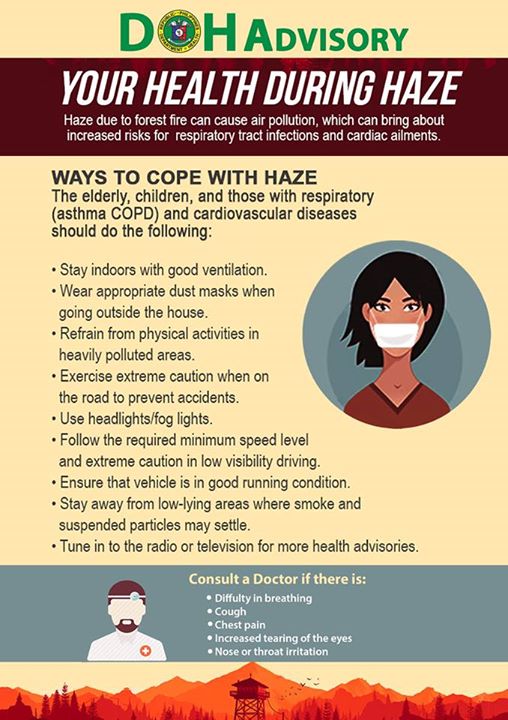
MANILA – The Department of Health (DOH) reiterated on Monday its advice to young children and elderly people with breathing problems or respiratory diseases to stay indoors and avoid outdoor activities in the areas affected by the haze from Indonesian forest fires.
“For children in the areas monitored with haze, we encourage them to stay indoors,” said DOH Secretary Janette L. Garin in a press briefing held at the DOH Media Relations Unit in Tayuman, Sta. Cruz, Manila.
Dr. Garin said that based on the current reports they gathered from the Environmental Management Bureau of the Department of Environment and Natural Resources (DENR), the haze – giving off very small particulate matters – has been felt since Oct. 18 in areas in Cebu, Palawan, Southern Mindanao, Leyte, General Santos City and Cotabato.
She said that children in the mentioned areas are not encouraged with outdoor activities because children tend to breathe faster and may inhale particles of haze that may aggravate any existing pulmonary conditions and other existing health problems.
Elderly people with existing health problems are also advised by the DOH to follow the same precaution.
Secretary Garin said the presence of the very tiny particulate matters, also called polluting matters, can penetrate the blood vessels so those with diabetes, heart problems, bronchitis, asthma and other diseases are advised to take precautions because such can aggravate their conditions and trigger attacks.
For his part, DOH Assistant Secretary Gerardo Bayugo said that since the bronchial tubes of children are quite small than the adults, they (the children) are more at risk with the particulate matters which have a measurement of 2.5 micrometers in diameter – too small and cannot be seen without the use of electron microscope.
“The particulate matters that reach us (our country) are the very small ones… The bigger ones usually can be filtered by our nasal hair,” said Dr. Bayugo.
“So just like what Secretary Garin said, if it is not necessary to stay outside and can be minimized, staying indoors as much as possible is the best option,” he added.
Secretary Garin also said that mask is recommended but she advised those with heart ailments to just confine themselves safely inside their homes so they do not need to use mask and avoid any negative impacts of haze.
She also expressed hope that the haze will be blown away by the coming northeast monsoon.
The Health chief said she has instructed all DOH regional directors to immediately report to the central office any suspected case of haze effects so that proper management can be immediately carried out.
Look at DOH’s advisory on ways to cope with haze:
